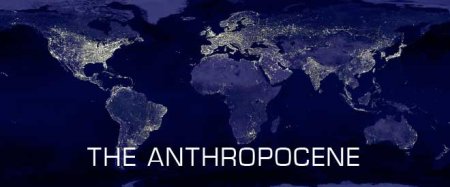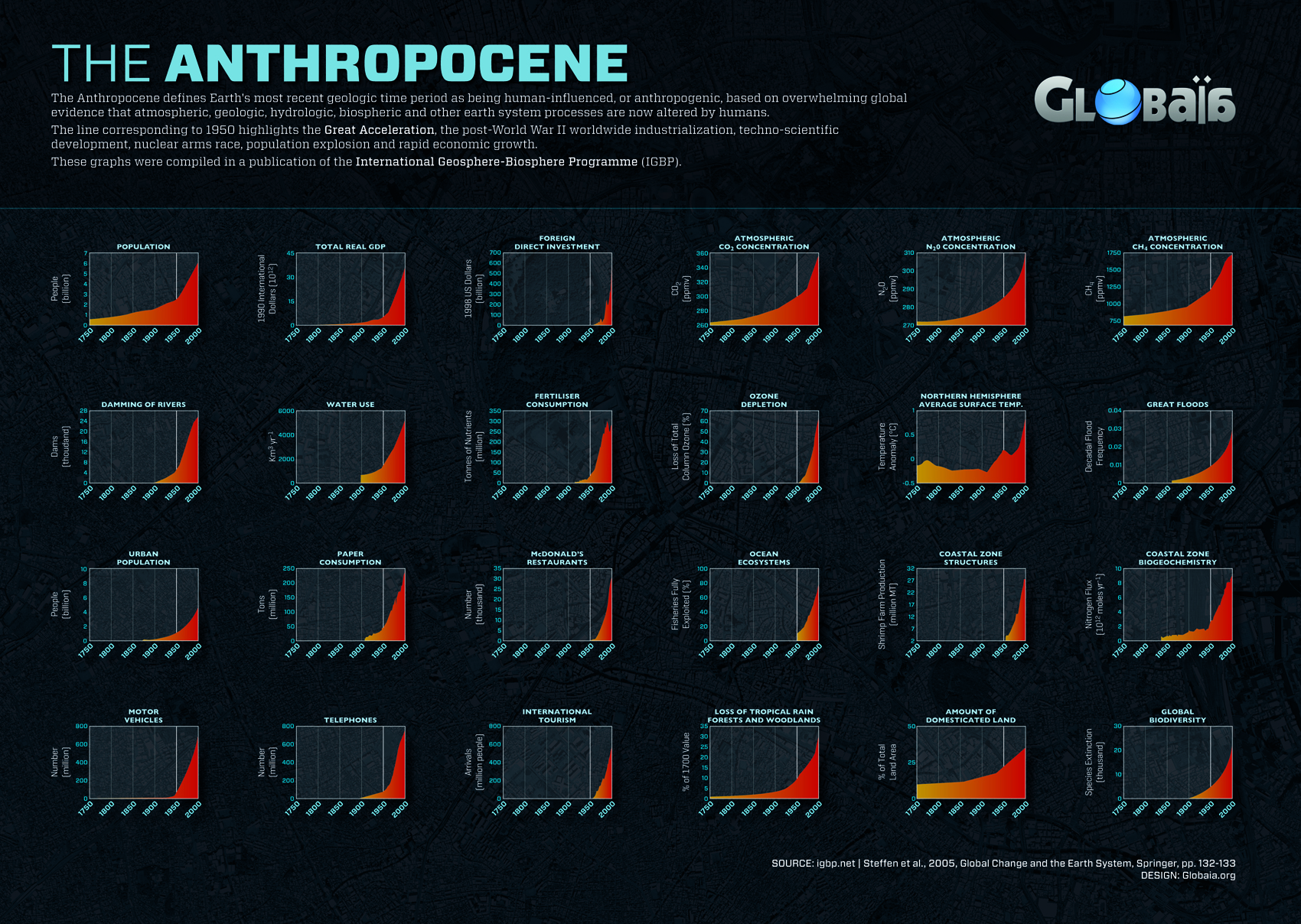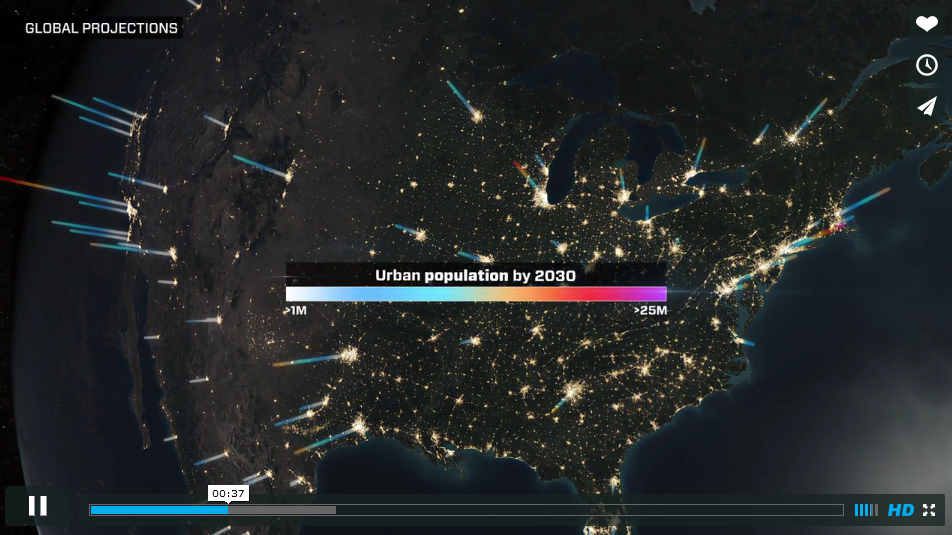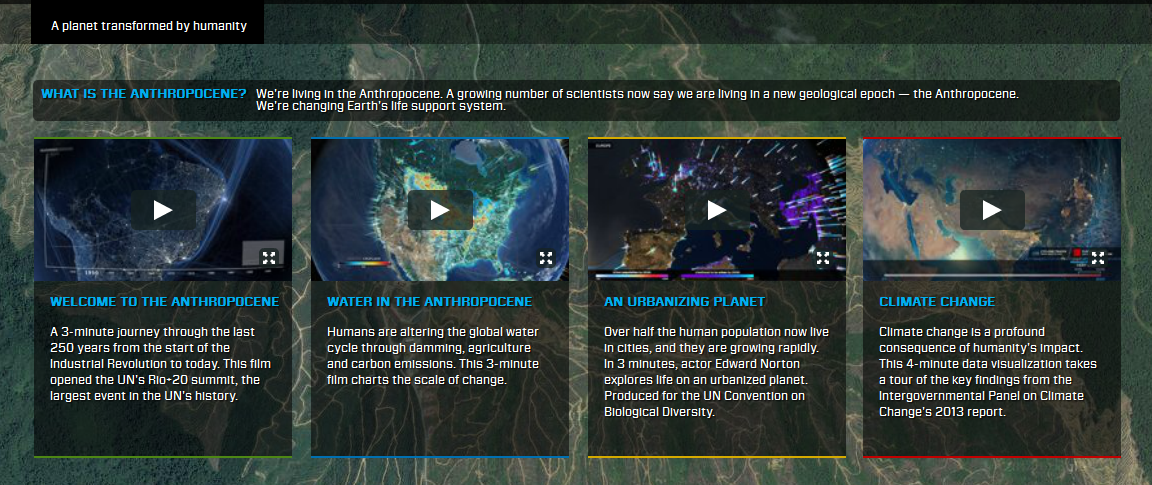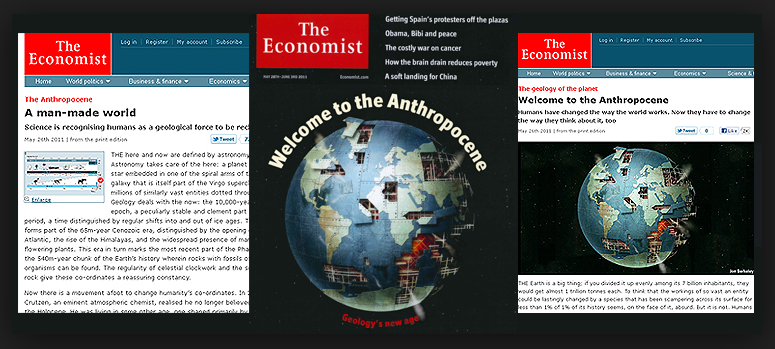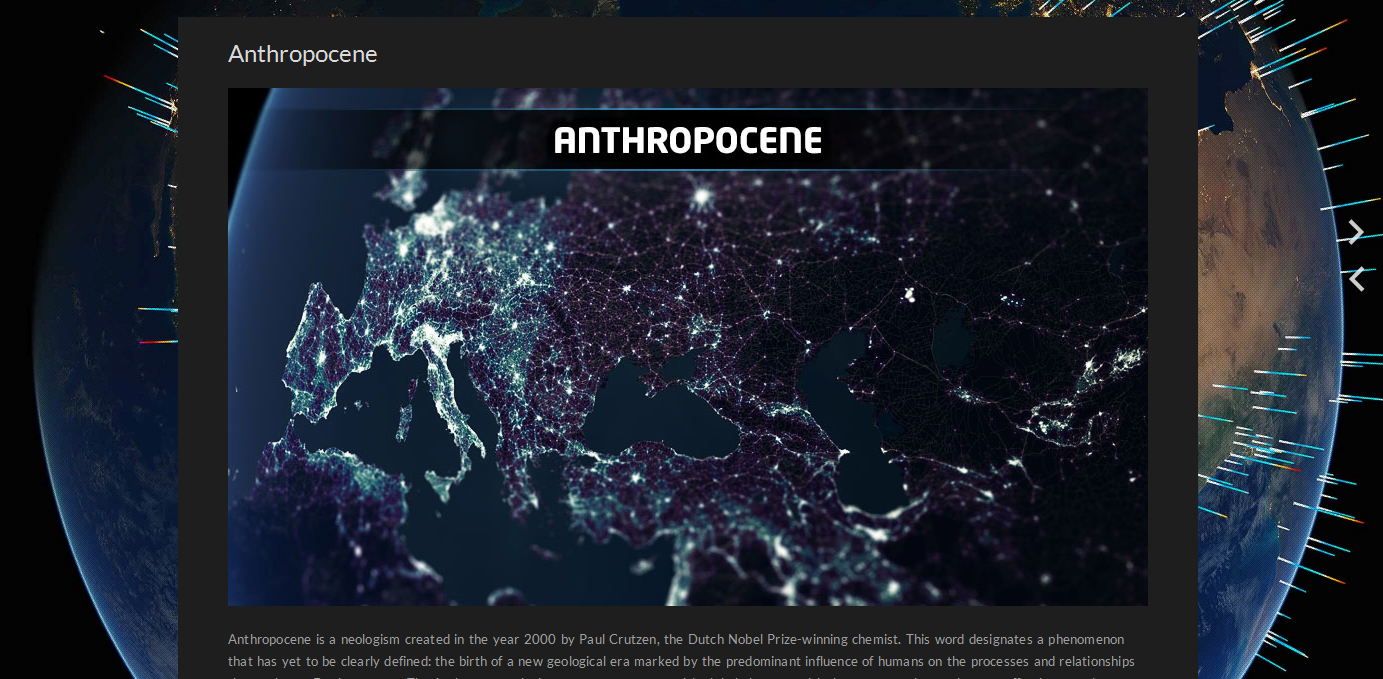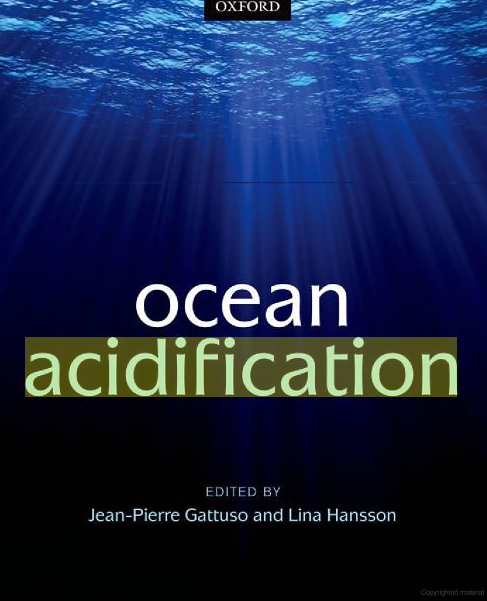Anthropocene: Difference between revisions
Siterunner (talk | contribs) No edit summary |
Siterunner (talk | contribs) No edit summary |
||
| Line 9: | Line 9: | ||
Humans and their creations/products/industries/developments/lifestyles/extractions and emissions are having an impact on [http://www.greenpolicy360.net/mw/images/La-Ley-de-la-Madre-Tierra.jpg Planet Earth or, as often called by native people, 'Mother Earth'.] As it is, the human species no longer stands 'outside' the forces of nature (if we ever did) but rather we are now impacting and changing the patterns and dynamics of nature going forward. | Humans and their creations/products/industries/developments/lifestyles/extractions and emissions are having an impact on [http://www.greenpolicy360.net/mw/images/La-Ley-de-la-Madre-Tierra.jpg Planet Earth or, as often called by native people, 'Mother Earth'.] As it is, the human species no longer stands 'outside' the forces of nature (if we ever did) but rather we are now impacting and changing the patterns and dynamics of nature going forward. | ||
On climate (yes, [http://quotes.yourdictionary.com/author/james-inhofe/ Senator Inhofe], you are impacting), on agriculture, oceans, | On climate (yes, [http://quotes.yourdictionary.com/author/james-inhofe/ Senator Inhofe], you are impacting), on agriculture, oceans, air and water, forests and fisheries, species and varieties, food chains beginning with the least of creatures ([File:Phyto glowing beauty of the oceans.jpg phytoplankton time]) to the large, recognizably endangered mammals, the modern, industrial activities of humankind are shifting the geologic era in which we live. Anthro-genetic that we are, we will continue to shift future dynamics of nature, changing systems over time as we develop economically and populations surge. The extent of humanity's impact on the planet is only now beginning to be measured, with baseline data and science surveying the extent and depth of change -- and the resulting impacts on natural systems are sending flashing, warning signals. The evidence is strong and, apart from those in denial, the evidence is growing, strongly suggesting it is time to act to find new ways to sustain the biosphere and environmental systems on which our quality of life depends. | ||
○ ○ ○ ○ | ○ ○ ○ ○ | ||
Revision as of 04:05, 12 February 2015
- Anthrocene or Anthropocene?
Anthropogenic or anthropogenically? Anyway you look at it, you and your billions of fellow anthro-inhabitants are having an impact...
○ ○
Humans and their creations/products/industries/developments/lifestyles/extractions and emissions are having an impact on Planet Earth or, as often called by native people, 'Mother Earth'. As it is, the human species no longer stands 'outside' the forces of nature (if we ever did) but rather we are now impacting and changing the patterns and dynamics of nature going forward.
On climate (yes, Senator Inhofe, you are impacting), on agriculture, oceans, air and water, forests and fisheries, species and varieties, food chains beginning with the least of creatures ([File:Phyto glowing beauty of the oceans.jpg phytoplankton time]) to the large, recognizably endangered mammals, the modern, industrial activities of humankind are shifting the geologic era in which we live. Anthro-genetic that we are, we will continue to shift future dynamics of nature, changing systems over time as we develop economically and populations surge. The extent of humanity's impact on the planet is only now beginning to be measured, with baseline data and science surveying the extent and depth of change -- and the resulting impacts on natural systems are sending flashing, warning signals. The evidence is strong and, apart from those in denial, the evidence is growing, strongly suggesting it is time to act to find new ways to sustain the biosphere and environmental systems on which our quality of life depends.
○ ○ ○ ○
Take just a few of recent discussions re: us and our planet:
Is Earth in a new geological phase thanks to us?
Air, what about the atmosphere? "It's razor thin
○ ○ ○ ○ ○ ○ ○ ○ ○ ○
○ ○ ○ ○ ○ ○ ○ ○ ○ ○ ○ ○
Back to the Anthrocene
In 1992, the science writer Andrew Revkin – in his book Global Warming: Understanding the Forecast – coined the term “Anthrocene” to describe a new geological era dominated by the actions of humans. Slideshare
More recently, he has quoted from his book: “We are entering an age that might someday be referred to as, say, the Anthrocene. After all, it is a geological age of our own making. The challenge now is to find a way to act that will make geologists of the future look upon this age as a remarkable time, a time in which a species began to take into account the long-term impact of its actions.” It now appears that like all respectable geological eras, the Anthrocene will be clearly identifiable as a distinct transition in the stratigraphy of the rocks that will make up that future world.
Over the past 200 years, the oceans have absorbed about half of the Carbon dioxide released into the atmosphere as a by-product of burning fossil fuels such as oil and gas. Researcher’s form the National Oceanic and Atmospheric Administration in the US have been monitoring the acidifying effect that this additional Carbon dioxide is having on the oceans, and have found a detectable decline in pH. Studies by other groups indicate that even small changes in pH have detrimental consequences on species that build their shells out of calcium carbonate, and particularly those in cold water ecosystems, which appear to be sensitive to levels of acidification that could occur in the oceans over the next few decades. These organisms; including sea urchins, cold-water corals, coralline algae, and plankton known as pteropods, provide essential food and habitat to others, their demise could affect entire ocean ecosystems.
The calcite shells of these creatures are also the raw material from which limestone rock is formed, a fact that could result in the beginning of the “Anthrocene” era made visible to future geologists as a stratigraphic boundery, formed by reduced limestone formation, and a period of mass extinction in the oceans. It seems that humans could now be changing the very bed-rock of the planet on which they live; it is a very remarkable time indeed!
○ ○ ○ ○ ○ ○ ○ ○ ○ ○ ○ ○
- The Word
... from the Greek ἄνθρωπος anthropos, "human"
The word anthropocene takes off
○ ○ ○ ○ ○ ○ ○ ○ ○ ○ ○ ○
- Welcome Anthro
Welcome to the Anthropocene (HD Vids - multilanguage)
○ ○ ○ ○ ○ ○ ○ ○ ○ ○ ○ ○
- Guides to the Anthropocene
http://www.anthropocene.info/en/home
○ ○ ○ ○ ○ ○ ○ ○ ○ ○ ○ ○
https://urbantimes.co/2011/07/gorgeous-visualisations-of-the-anthropocene-era/
○ ○ ○ ○ ○ ○ ○ ○ ○ ○ ○ ○
Globaia - http://globaia.org/about/
http://globaia.org/portfolio/filmography/welcome-to-the-anthropocene/
○ ○ ○ ○ ○ ○ ○ ○ ○ ○ ○ ○
- Anthropogenic, anthropogenically
Mourning Our Planet: Climate Scientists Share Their Grieving Process
Anthropogenic climate disruption (ACD)... both as victims - fragile human beings – and as perpetrators: We are the species responsible for altering the climate system of the planet we inhabit to the point of possibly driving ourselves extinct...
http://en.wikipedia.org/wiki/Human_impact_on_the_environment
○
The 6th Extinction -- http://www.npr.org/2014/02/12/275885377/in-the-worlds-sixth-extinction-are-humans-the-asteroid
○ ○ ○ ○
- Mass extinctions and ocean acidification
http://link.springer.com/article/10.1007/s00338-008-0381-8#page-1
Primary causes of mass extinctions are linked in various ways to the carbon cycle in general and ocean chemistry in particular with clear association with atmospheric carbon dioxide levels.
The prospect of ocean acidification is potentially the most serious of all predicted outcomes of anthropogenic carbon dioxide increase.
Acidification has the potential to trigger a sixth mass extinction event and to do so independently of anthropogenic extinctions that are currently taking place.
○
"Human beings are now carrying out a large scale geophysical experiment of a kind that could not have happened in the past nor be reproduced in the future."
http://www.aip.org/history/climate/Revelle.htm
